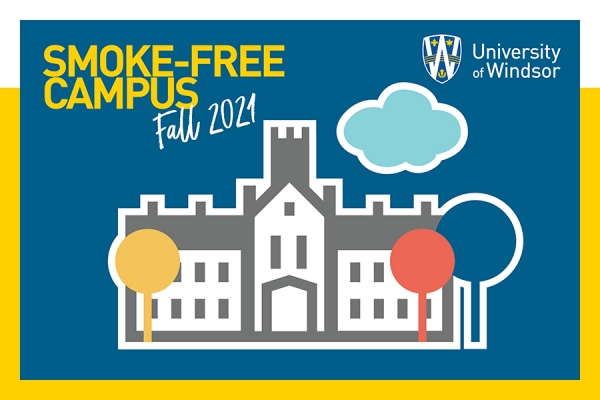 The University of Windsor will become an entirely smoke-free campus in fall 2021.
The University of Windsor will become an entirely smoke-free campus in fall 2021.
In fall 2021 the University of Windsor will join a growing number of post-secondary institutions in becoming an entirely smoke-free campus.
The process began in March 2020 as the University reached out to the campus community for help in shaping the Smoke-Free Campus policy and its associated education, awareness raising, supports, and enforcement strategies. The initiative was temporarily put on hold as the University moved to an essential services model in response to the COVID-19 pandemic.
According to a recent report from the Canadian Cancer Society, more than 95 Canadian universities and colleges are now 100 per cent smoke-free. As the University continues planning for a safe and gradual return to campus, the timing is now right to move forward with this important community health initiative.
Becoming a smoke-free campus — which includes tobacco, cannabis and vaping — is a significant milestone in the University’s ongoing effort to foster a healthy and safe learning and working environment for all. As well, it provides an opportunity to enhance awareness about the health risks associated with tobacco use, cannabis use, and vaping.
A smoke-free campus also provides a physical environment that supports individuals in their efforts to resist or quit smoking. There will be some exceptions to the policy, including burning of the traditional and sacred medicines that are part of Indigenous cultural and spiritual practices.
To plan and prepare for this change to campus, the University established a steering committee as well as two working groups with representation from students, staff, faculty, and subject-matter experts. The information gathered through the campus consultation activities held in 2020 will shape the work of the steering committee and working groups.
In the coming months, as the Smoke-Free Campus policy is drafted, members of the campus community will have an opportunity to provide additional feedback. Throughout the process, questions, ideas, and concerns can be shared through the “Share Your Thoughts” online form on the Smoke-Free Campus website: www.uwindsor.ca/smokefreecampus.
Did you know?
- Smoking remains one of the leading causes of preventable death in Canada, with 37,000 Canadians dying from smoking related conditions annually (the Lung Association of Ontario, 2018);
- Second-hand smoke causes more than 800 heart disease and lung cancer deaths in Canada annually (Health Canada);
- Studies have determined that an individual’s health will begin to improve as soon as 20 minutes after quitting (www.smokershelpline.ca).
